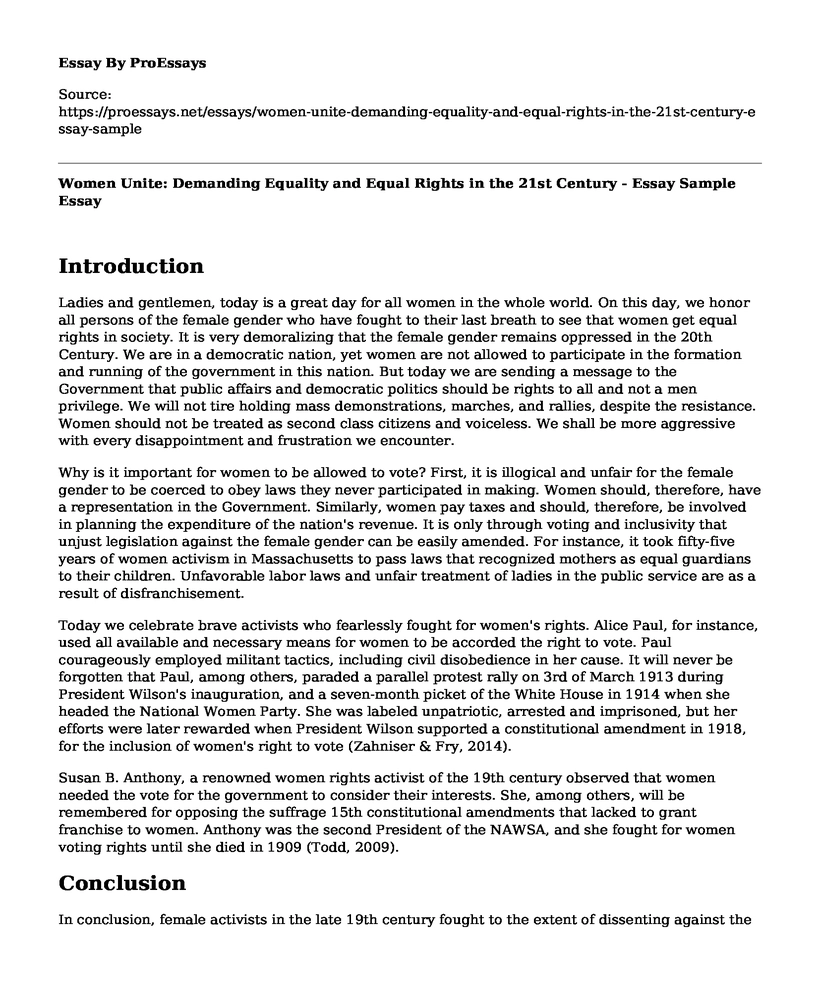Introduction
Ladies and gentlemen, today is a great day for all women in the whole world. On this day, we honor all persons of the female gender who have fought to their last breath to see that women get equal rights in society. It is very demoralizing that the female gender remains oppressed in the 20th Century. We are in a democratic nation, yet women are not allowed to participate in the formation and running of the government in this nation. But today we are sending a message to the Government that public affairs and democratic politics should be rights to all and not a men privilege. We will not tire holding mass demonstrations, marches, and rallies, despite the resistance. Women should not be treated as second class citizens and voiceless. We shall be more aggressive with every disappointment and frustration we encounter.
Why is it important for women to be allowed to vote? First, it is illogical and unfair for the female gender to be coerced to obey laws they never participated in making. Women should, therefore, have a representation in the Government. Similarly, women pay taxes and should, therefore, be involved in planning the expenditure of the nation's revenue. It is only through voting and inclusivity that unjust legislation against the female gender can be easily amended. For instance, it took fifty-five years of women activism in Massachusetts to pass laws that recognized mothers as equal guardians to their children. Unfavorable labor laws and unfair treatment of ladies in the public service are as a result of disfranchisement.
Today we celebrate brave activists who fearlessly fought for women's rights. Alice Paul, for instance, used all available and necessary means for women to be accorded the right to vote. Paul courageously employed militant tactics, including civil disobedience in her cause. It will never be forgotten that Paul, among others, paraded a parallel protest rally on 3rd of March 1913 during President Wilson's inauguration, and a seven-month picket of the White House in 1914 when she headed the National Women Party. She was labeled unpatriotic, arrested and imprisoned, but her efforts were later rewarded when President Wilson supported a constitutional amendment in 1918, for the inclusion of women's right to vote (Zahniser & Fry, 2014).
Susan B. Anthony, a renowned women rights activist of the 19th century observed that women needed the vote for the government to consider their interests. She, among others, will be remembered for opposing the suffrage 15th constitutional amendments that lacked to grant franchise to women. Anthony was the second President of the NAWSA, and she fought for women voting rights until she died in 1909 (Todd, 2009).
Conclusion
In conclusion, female activists in the late 19th century fought to the extent of dissenting against the law for the government and the entire society to consider women's rights. But eventually, ladies and gentlemen, there is hope. Light is shining at the end of the tunnel. So far, we have the support of our beloved president, Woodrow Wilson. Similarly, the House of Representatives is in the process of passing the 19th constitutional amendment on women voting rights. Approximately thirty states have already ratified the amendment, which means that we are approaching the three-fourths requirement. Even though most of the early feminist activists did not live long enough to witness this victory, we shall witness on their behalf. This is just the beginning as gender equality must be fully realized.
References
Zahniser, J.D. & Fry, A.R. (2014). Alice Paul: Claiming Power. Oxford: Oxford University Press.
Todd, A.M. (2009). Susan B. Anthony: Activist. New York: Inforbase PublishingBottom of Form
Cite this page
Women Unite: Demanding Equality and Equal Rights in the 21st Century - Essay Sample. (2023, Mar 26). Retrieved from https://proessays.net/essays/women-unite-demanding-equality-and-equal-rights-in-the-21st-century-essay-sample
If you are the original author of this essay and no longer wish to have it published on the ProEssays website, please click below to request its removal:
- Research Paper on Substance Abuse and Domestic Violence among Teens
- Feminist's Issue in Hedda Gabler Essay
- Research Paper on Carfentanil
- High Risk Sexual Behavior Among Homeless Youth - Essay Sample
- Essay Sample on Gender Inequality: A Global Issue in Education Systems
- Research Proposal on Racial Discrimination against Minority Immigrants in America
- Article Analysis Essay on "The Longest War"







